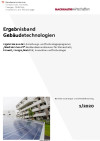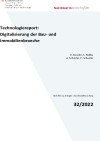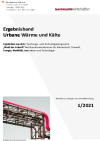Suchergebnisse
Entwicklung einer Lehmbauplatte mit malfertiger Oberfläche

Entwicklung einer Holzträgerplatte mit BioFaserLehm -Beschichtung für die aussteifende Beplankung von Holzkonstruktionen und ebenso für statisch nicht beanspruchte Innenwand-oberflächen.
Walchfenster04 - vom Funktionsmuster zum seriennahen Prototyp
Ausarbeitung des Funktionsmusters des Fenster- und Fassadensystemes walchfenster04 zu einem seriennah produzierbaren Prototyp inkl. Entwicklung der benötigten neuen Produktionsprozesse und -technologien.
Ergebnisband „Gebäudetechnologien“

Der vorliegende Ergebnisband stellt abgeschlossene Projekte aus dem Forschungs- und Technologieprogramm „Stadt der Zukunft“ des Bundesministeriums für Klimaschutz, Umwelt, Energie, Mobilität, Innovation und Technologie (BMK) im Bereich innovativer Gebäudetechnologien vor. Die gewonnenen Erkenntnisse sollen eine Entwicklung in Richtung energieeffiziente und klimaverträgliche Stadt unterstützen, die auch dazu beiträgt, die Lebensqualität und die wirtschaftliche Standortattraktivität zu erhöhen.
Schriftenreihe
1/2020
Redaktionelle Gestaltung: Bianca Pfefferer, Hannes Warmuth (ÖGUT)
Herausgeber: BMK, Aktualisierung: Mai 2021
Deutsch, 25 Seiten
Downloads zur Publikation
Technologiereport: Digitalisierung der Bau- und Immobilienbranche

In der Vielzahl digitaler Möglichkeiten ist es nur sehr schwer möglich, einen Überblick zu behalten, Trends und Potentiale abzuschätzen sowie Zusammenhänge zu erkennen. Der vorliegende Report zielt daher darauf ab, den aktuellen Stand der Technik und die Markteinschätzung vielversprechender digitaler Technologien zu beschreiben. Es werden Informationen über konkrete Anwendungsfälle, Mehrwert und Herausforderungen der jeweiligen Technologien bereitgestellt. Die dargestellten Analysen dienen der Potentialbewertung und der strategischen Weichenstellung zur Integration der aktuell wichtigsten digitalen Technologien der Bau- und Immobilienbranche.
Schriftenreihe
32/2022
K. Künzler, S. Robbi, A. Schuster, P. Schuster
Herausgeber: BMK
Deutsch, 92 Seiten
Downloads zur Publikation
Mechanische Fensterlüftungsanlagen für die Althaussanierung
Analyse und Implementierungsmöglichkeit von alternativen Fensterlüftungsanlagen mit Fokus auf thermische Sanierung von Altbauten. Im Rahmen einer Technologierunde wurden die recherchierten und aufbereiteten Lüftungssysteme eine Gruppe Experten präsentiert. Zielsetzung war es, die Lüftungstechnologien anhand verschiedenster Aspekte zu diskutieren und zu jedem System eine SWOT-Analyse zu erarbeiten.
Development of a new generation of grid-connected PV inverters
Improvement of operational parameters (efficiency, quality of current waveform, reduced size and weight) and reduction of manufacturing costs
LINE-FEED - Plug-in Photovoltaik-Speicher für die Steckdose
Im Projekt LINE-FEED wurden Technologien entwickelt, die für einen Photovoltaik-Speicher benötigt werden, der von jedem Laien an einer gewöhnlichen Steckdose angeschlossen werden kann. Ziel war die Entwicklung eines Speichersystems für Haushalte in urbanen Räumen, welche selbst keine Möglichkeit der Installation einer Photovoltaikanlage haben.
LINE-FEED - Plug-in Photovoltaic Storage for the Wall Socket
The project LINE-FEED developed technologies that are required for a photovoltaic storage system which can be installed by anybody by simply plugging it into a wall socket. The aim was to create a storage system for households in urban areas that do not have the possibility to install a photovoltaic system themselves.
Ergebnisband „Urbane Wärme und Kälte“

Der vorliegende Ergebnisband stellt abgeschlossene Projekte aus dem Forschungs- und Technologieprogramm „Stadt der Zukunft“ des Bundesministeriums für Klimaschutz, Umwelt, Energie, Mobilität, Innovation und Technologie (BMK) im Bereich Urbane Wärme und Kälte vor. Die gewonnenen Erkenntnisse sollen eine Entwicklung in Richtung energieeffiziente und klimaverträgliche Stadt unterstützen, die auch dazu beiträgt, die Lebensqualität und die wirtschaftliche Standortattraktivität zu erhöhen.
Schriftenreihe
1/2021
Redaktionelle Gestaltung: Bianca Pfefferer, Hannes Warmuth (ÖGUT)
Herausgeber: BMK
Deutsch, 24 Seiten
Downloads zur Publikation
Passivhaustauglicher Scheitholzofen kleiner Leistung

Scheitholzofen kleiner Leistung, der für den Einsatz im Passivhaus optimiert wird. Durch "gedämmte Speichermassen" in Verbindung mit Klappen zur Regulierung der Abgabeleistung soll der gewünschte Leistungsbereich <1 kW (bis max 3kW Spitze) erreicht werden.
Development of modular parts for clay-passive houses

Development of extensive storey-high modular parts made of renewable primary products (wood, straw, hemp) for clay-passive houses.
Innovativer Solarregler für thermische Solaranlagen
Erforschung der technischen Machbarkeit eines Solarreglers für thermische Solaranlagen, welcher ohne konventionelle Kollektor- u. Speichertemperaturfühler auskommt
smart façade - energy potential of adaptive façade systems
A specially developed simulation model is employed to ascertain the energetic potential of adaptive façade systems. The dynamic behavior of the physical properties of the adaptive façade system reacts to both internal and external changing conditions. The goal was the development of an adaptive façade, which helps provide maximum comfort for the building occupants with minimum energy consumption.
WHISCERS. Whole House In-Situ Carbon & Emission Reduction Solution
Whiscers ist ein System für die Installation von Innenwanddämmung in Bestandsgebäude, ohne dass der Nutzer für diese Umbauphase ausziehen muss. Technologisch geht es um das Bauaufmaß der inneren Wandgeometrie mit Hilfe eines Laser-Gerätes, das eine schnelle und hochgenaue Messung ermöglicht. Die Informationen werden elektronisch aufbereitet und auf eine Computer-gesteuerte Off-Site-Schneidemaschine geschickt, die eine schnelle, präzise und passgenaue Fertigung der benötigten Innenwandelemente ermöglicht.
Alternative insulation made from modified lignocellulosic fibers
Wood as the raw material for a new insulation material
WHISCERS. Whole House In-Situ Carbon & Emission Reduction Solution
Whiscers is a system for installing internal wall insulation with minimal mess, whilst the resident remains in the property. It involves measuring the walls in the property using a laser device that enables fast and highly accurate measurement. Information is then sent electronically to a computer controlled off-site cutting machine that is rapid, precise and mess-free.
oh 456 - Energieautarkes Plusenergie-Dienstleistunsgebäude oh456
Das Plusenergiebürogebäude oh456 mit angeschlossenem Kleinwasserkraftwerk soll als Prototyp für die Erprobung innovativer Technologien dienen und den darin angesiedelten Unternehmen eine ganzheitliche Heimat inklusive gemeinsamer Pausen- und Freizeitgestaltung bieten. Einer breiteren privaten wie auch gewerblichen Öffentlichkeit wird das Gebäude als Ort für verschiedenste Veranstaltungen, als Anschauungs- und Vortragsobjekt zum Thema Klimaentlastung wie auch als gemeinsame Werbeplattform für nachhaltiges Bauen zugänglich gemacht.
Modularer und standardisierter Holzmassivbau für Passivhäuser
Für die fehlerfreie und adaptierbare Herstellung von zwei- bis viergeschossigen Holzmassiv-Passivhäusern soll für Planer und Hersteller ein modular aufgebautes Konstruktions- und Dimensionierungssystem mit standardisierten baukastenartigen ökologisch bewerteten Detaillösungen digital zur Verfügung gestellt werden. Dadurch wird auch kleinen Zimmereibetrieben eine fehlerfreie Dimensionierung und Errichtung von Passivhäusern ermöglicht.
Kleinwindkraftanlagen für Einfamilienhäuser und Kleinbetriebe
Erhebung des Energiepotentials mit möglichst für schwache Windverhältnisse optimierten Kleinwindkraftanlagen an unterschiedlich gut geeigneten Standorten für Einfamilienhäuser und Kleinbetriebe im praktischen Feldversuch.
Energy Efficiency and Risk Management in Public Buildings (EnRiMa)
The major objective of the project EnRiMa was to develop an internet based decision-support system (DSS) to enable operators of public buildings to increase the system efficiency as well as to reduce the CO2 emissions. The DSS can be linked to existing energy management systems as DESIGOTM. The University of Applied Science Burgenland, Campus Pinkafeld, and ENERGYbase, Vienna, have been used to test and calibrate the EnRiMa DSS.
